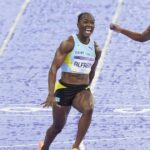Disabled voters for Harris. White dudes for Harris. Crazy cat ladies for Harris.
Since Vice President Kamala Harris vaulted into becoming the likely Democratic nominee for president, a groundswell of identity-based grassroots groups sprung up online to rally behind her. The nightly calls are raising millions of dollars and securing hundreds of volunteers, drawing comparisons to the grassroots efforts that fueled former President Barack Obama to victory in 2008.
The Democratic Party chair announced Friday that Harris secured enough votes from Democratic delegates to become her party’s presidential nominee. In an era when identity shapes so much of politics, the rise of the first Black woman and first Asian American to be nominated for president by a major party is drawing more identity groups out of the woodwork.
“This is unprecedented diversity in the political pool,” said Pei-Te Lien, a professor in UC Santa Barbara’s Politics of Identity program. “That’s another reason why ‘identity group’ comes up, because we also see identity being recognized and used as leverage in the campaigns, in an unprecedented level.”
People are also reading…
Within hours after President Joe Biden announced July 21 that he would not seek reelection and endorsed Harris as his replacement nominee, more than 44,000 Black women and allies from across the country gathered online, raising over $1.5 million, according to organizers. The template for that event, organized by Win With Black Women, was repeated the next day by Win With Black Men, which organizers said drew 45,000 Black men and raised $1.3 million.
“It’s organic,” said Los Angeles City Council member Nithya Raman, who attended a recent Zoom call for South Asians supporting Harris. “I think people are clear-eyed about what this moment means. I think they just feel a sense of hope that we actually could defeat Trump, and we could do it with a candidate that reflects the America that all these immigrants live in.”
The flood of groups — including Latino Men for Harris, Caribbean-Americans for Harris, Dads for Kamala and Native Women + Two Spirit for Harris — are motivated by a “sense of crisis,” Lien said.
“They feel like we are not in the mainstream — we are not able to have too much influence,” she said. “But we feel like we need to do our share to be able to help change the course. To prevent, basically, the coming apocalypse or whatever.”
Former President Donald Trump courted Black and Latino voters this year, and has been drawing greater support from minority groups than he did in his prior two campaigns. But fewer identity-based groups are organized for Republicans.
When white women took to Zoom recently to support the Democrat, a technical glitch forced the livestream to abruptly end just a few minutes after it began. Later, organizers found out why in a message from Zoom: “You are officially hosting the Zoom webinar with the most registrants in our history!”
“Kamala Harris broke Zoom!” one of the hosts exclaimed.
Some of the white women who logged on said the idea of supporting Kamala Harris as an identity group was empowering. But it was also uncomfortable.
“I have to admit: When I was writing stuff down, I was like, ‘Karens for Kamala’?” said Connie Britton, the actor who played Tami Taylor on “Friday Night Lights.” “Why is it so difficult for us to acknowledge and address ourselves as white women?”
The “White Dudes for Harris” call Monday, which 193,000 people attended, shared similar self-consciousness.
“What a variety of whiteness,” actor Bradley Whitford quipped. “It’s like a rainbow of beige.”
Ross Morales Rocketto, the group’s lead organizer, said a lot of people expressed discomfort about the concept of White Dudes for Harris. He understood their qualms: “Throughout American history, when white men have organized, it was often with pointy hats on.”
“The reason we are doing this is because the left has been ceding white men to the MAGA right for way, way too long,” Rocketto said, noting Trump won more than 60% of white men in 2016 and 2020. “That’s going to stop tonight. We know that the silent majority of white men aren’t actually MAGA supporters.”
The group drew negative attention and mockery from conservatives. “They should give it a more fitting name,” Donald Trump Jr. wrote on X. “Like Cucks for Kamala.”
Before Shannon Watts, the activist and founder of gun control group Moms Demand Action, organized the white women’s meeting, she called Jotaka Eaddy, organizer of the Black women’s Zoom, seeking her counsel.
“She told me that white women did need to come together as a community to do the work,” Watts said. “Because our work is very different.”





